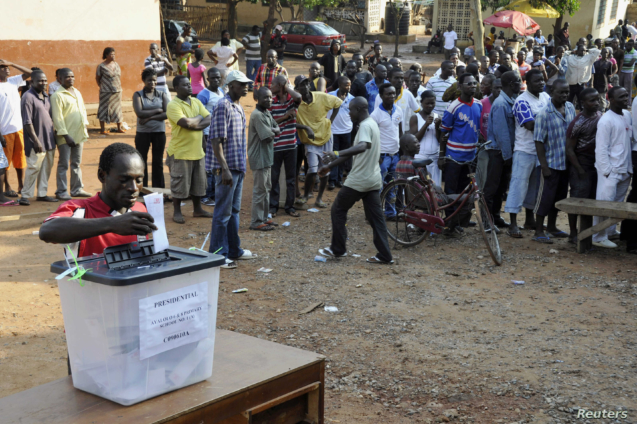Elections over the years have seen different faces of political leaders taking up the mantle to lead various political parties. However, for these political parties to win an election it is up to the voter to decide.
The choice of voters is crucial to every political party because voters determine who leads lead them in a parliamentary or a presidential race.
After every single election, the electoral results show that numerous considerations may have influenced the decision making of a voter.
While some are due to personal experience with the political parties, party policies, campaign promises, and the credibility of the political leader, others vote just for the love of the party.
A vivid example was captured in the 2012 and 2016 elections.
In the elections, the NPP and NDC put forward the same presidential candidates in both contests, but the outcomes were different.
John Mahama of the NDC, who had defeated the NPP’s Nana Akufo-Addo in the 2012 elections, lost to the latter in the 2016 elections.
It begs the question, how did this happen?
Nevertheless, according to Boateng (2018), John Mahama won in the 2012 election because of his personality.
People voted for Mahama because of his calm character, realism, and openness. Put briefly, Akufo-Addo lost because people felt more comfortable with Mahama’s personality.
However, it is argued that the incumbent John Mahama lost credibility in the run-up to the 2016 election. His administration was accused of incompetence, poor economic performance, corruption, and abuse of power.
As a result, his approval ratings dipped, and the electorate found the opposition candidate more credible to run the country.
Thus, the results of the 2012 and 2016 elections show how candidates’ credibility can influence electoral outcomes.
Very often, voters become political fanatics and ideologues when it comes to voting.
Regardless of whether the NPP or NDC party has performed positively or deleteriously in terms of transparency, accountability or development and most voters maintain their commitment to either party.
This loyalty is a contributing factor in putting Ghana in the hands of the wrong “power seekers”.
In Ghana, some electorates vote regardless of their political party’s achievements and record of accomplishment. Therefore, if it is NPP or NDC they support, then its NPP or NDC for life.
Interestingly, these type of voters (ideologues), are the majority in our voting systems.
This is according to a research work by Apaah (2017) which revealed that what appears to be the most dominant determinant of voting was party identification as well as their affection for their parties.
Now, the various regions in Ghana have become associated with specific political parties because of their consistent voting patterns.
The voting patterns of the newly created regions are yet to be determined but the Volta region;the then Upper West, Upper East and Northern regions have been tied to the NDC because of the consistent electoral support the party receives from these regions.
Similarly, the NPP is identified with the Ashanti and Eastern regions because its highest electoral support comes from these regions.
The remaining four regions, namely Brong-Ahafo, Central, Greater Accra and Western regions are considered swing, or neutral, regions because they are not electorally devoted to any one specific political party.
Just as there is a belief that every vote counts, every electorate plays a significant role in determining who leads the country in the upcoming December 7, 2020 elections.
Voting for NPP, NDC or any other political party in the upcoming elections should not be because of one's affection for the party, or love for the party but rather be based on competence, track record, development and the others you think a government must be able to achieve to make Ghana better.
The NPP has ruled the country for over eight years likewise the NDC ruling for over 12 years. Both have had a chance to lead the country and the works of these two parties are visible to electorates, whether they did a good job or failed in their mandate to make Ghana better.
As we approach the polls on December 7, let all as electorates ask ourselves this question.
Personally, per the records, do the party you intend to vote for deserve another 4 years in office?
In addition, on what purpose are you deciding to vote for the desired political party?
Ending with a quote from Abraham Lincoln, he says, “Elections belong to the people. It is their decision. If they decide to turn their back on the fire and burn their behinds, then they will just have to sit on their blisters.”
May God bless our homeland Ghana and make our nation great and strong.
***
The writer is a student of the Ghana Institute of Journalism.
Latest Stories
-
Expansion Drive: Takoradi Technical University increases faculties
18 minutes -
SHS heads demand payment of outstanding funds before reopening of schools
54 minutes -
We thank God for the 2024 general elections – Akufo-Addo
1 hour -
Coconut Grove Beach Resort marks 30 years of excellence with memorable 9 lessons & carols service
1 hour -
WAFU B U-17 Girls’ Cup: Black Maidens beat Nigeria on penalties to win inaugral tournament
2 hours -
Real Madrid beat Sevilla to keep pressure on leaders Atletico
3 hours -
Liverpool put six past Spurs to go four points clear
3 hours -
Manchester United lose 3-0 at home to Bournemouth yet again
3 hours -
CHAN 2024Q: ‘It’s still an open game’ – Didi on Ghana’s draw with Nigeria
3 hours -
CHAN 2024Q: Ghana’s Black Galaxies held by Nigeria in first-leg tie
4 hours -
Dr Nduom hopeful defunct GN bank will be restored under Mahama administration
5 hours -
Bridget Bonnie celebrates NDC Victory, champions hope for women and youth
5 hours -
Shamima Muslim urges youth to lead Ghana’s renewal at 18Plus4NDC anniversary
6 hours -
Akufo-Addo condemns post-election violence, blames NDC
6 hours -
DAMC, Free Food Company, to distribute 10,000 packs of food to street kids
7 hours

